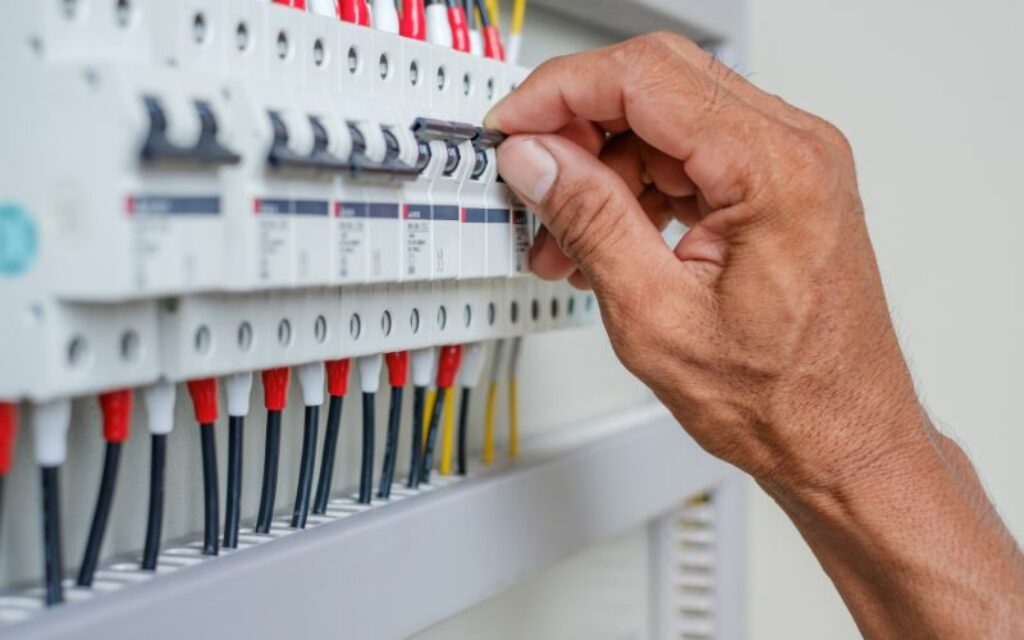A circuit breaker is a safety mechanism installed on electrical devices to disengage power and protect against damage automatically.
But that may be an oversimplification of what circuit breakers do—from the name itself, and it is clear that they’re meant to protect against something more than damaging your device.
Circuit breaker tips can help maintain your home’s electrical system and keep you safe during an outage.

Know the Signs of Circuit Breaker Failure
Like most people, you probably do not think much about your electrical system. But it’s essential to know the signs of a circuit breaker failure.
Here are some common signs that indicate your breaker is failing:
- You hear a loud pop or snap
- You smell burning wires or metal
- Your lights flicker or dim
Remember that it is crucial to know the signs and how to react.
When you see a circuit breaker trip, it is a good idea to determine if the circuit is safe. If it is, look at the circuit breaker to see if any damage needs to be repaired.
Then, call in a professional. If you need to figure out whether something is safe and don’t want to risk it, stay away from sensitive areas of your home until you’ve seen an electrician.
Practice Electrical Safety at Home
When it comes to circuit breakers, it’s important to remember that the more you practice electrical safety at home, the better prepared you will be when something goes wrong.
Here are five tips for practicing electrical safety at home:
- Use extension cords only when necessary.
- Turn off power before working on circuits.
- Never touch a live wire with your bare hands.
- If the appliance malfunctions or stops working properly, unplug it before touching anything else in the room (including other appliances).
- Don’t try to repair an electric circuit yourself because you don’t know what you’re doing—call an electrician instead.
Install the Right Circuit Breaker Size
Circuit breakers have a unique job. They are one of the most critical parts of your house and protect your home from power surges and electrical short circuit damage, which could result in a fire or electrical shock. To avoid unfortunate instances, the circuit breaker needs to be sized according to the type of wiring in your home and the amount of current expected to flow through it.
When you install circuit breakers for the first time, it’s a good idea to read up on how much current they should be rated for so that you get a sense of what size breaker is suitable for you. You can also count on your local electrician to help you with this.
Maintain Your Circuit Breakers
Keeping your circuit breakers in good shape is super important.
If you don’t maintain them and they fail, you’ll be sorry! But if you maintain them, they’ll keep working well into the future.
Also Read: 22 Unique Electrical Panel Cover Ideas + DIY Videos
Here’s how to maintain them:
Clean Them Regularly
You should check your circuit breakers at least once a month to ensure they’re clean and corrosion-free. If you see any corrosion or buildup on the terminals, give them a quick wipe-down with soap and water so that corrosion doesn’t fester into an even bigger problem.
Don’t Overuse Them
If your electrical system is overloaded, the chance of tripping one of your circuit breakers increases significantly—which means that the risk of an electrical fire increases significantly.
Suppose you have multiple receptacles in different rooms of your house.
In that case, it is worth investing in extra circuits to avoid having any issues with overloads or tripping circuits altogether.
Contact a Residential Electrician When You Experience Electrical Issues
When you have a problem with your electricity, you must contact an electrician immediately. If you wait too long, circuit breakers might already be tripped, and the damage could be irreversible.
You may think you know what to do when you see something that seems wrong with your circuit breaker, but many things can go wrong and cause problems.
You should contact a residential electrician if you are trying to figure out what to do or are unsure of the best course of action.
The residential electrician will be able to identify any possible problem and work with you on how to fix it.
Final Thoughts
These 5 circuit breaker tips are designed to keep you safe and healthy in the event of an electrical fire. If you are ever in this situation, shut off the main power switch and get everyone out of the house.
You do not want to take a chance of being injured or risking someone else’s life. Hopefully, it never happens to you or anyone you know, but it’s better to be safe than sorry.